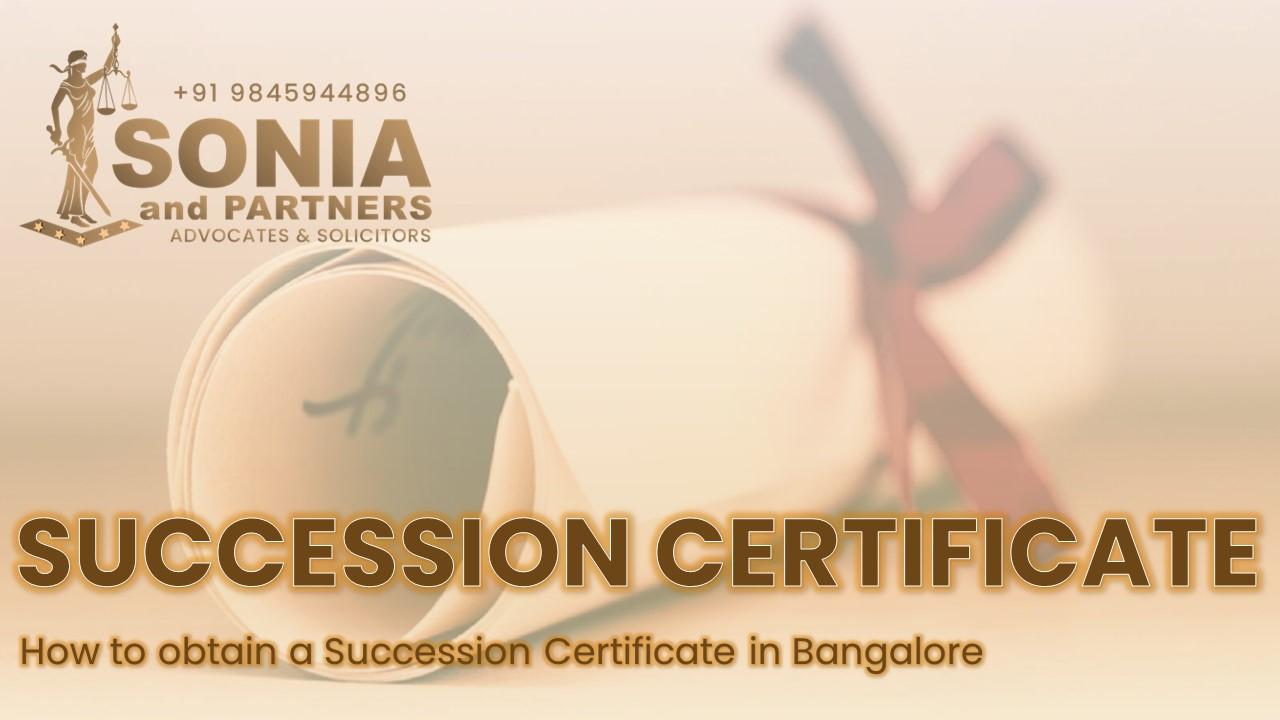Home Blog
Blog How to Get Succession Certificate in Bangalore
How to Get Succession Certificate in Bangalore

A Succession Certificate is a legal document issued by a court that grants the right to the legal heirs of a deceased person to inherit and transfer property, assets, and investments from the deceased person’s name to their own. The certificate is issued to the rightful heirs of the deceased and can be used to establish the ownership of the assets of the deceased person.
To obtain a Succession Certificate in Bangalore, you will need to follow these steps:
File a petition: You need to file a petition in the civil court of the jurisdiction where the deceased person lived or owned assets. The petition should contain the details of the deceased person, their date of death, and the list of legal heirs.
Gather the required documents: Along with the petition, you need to submit the death certificate of the deceased, their property documents, bank statements, and other relevant documents that establish their ownership along with your identity proofs, address proofs and Legal Heir Certificate.
Publication of Notice: Once the petition is filed, the court will issue a notice to the legal heirs and other interested parties. The notice will be published in a local newspaper, inviting objections, if any, to the petition.
Verification of claim: The court will verify the claims of the legal heirs and determine the rightful heirs of the deceased. Once the verification is done, the court will issue the succession certificate to the rightful heirs.
Payment of fees: You will need to pay court fees and legal charges for obtaining the succession certificate. The court levies a fixed percentage (2-3%) of the value of the securities/movable properties as a court fee for the purpose of issuance of the certificate, and the same is required to be paid at the time of issue of the Succession Certificate by the Court.
Cycle Time to Get the Succession Certificate: If the things fall in place and you have all the necessary documents, after the petition is filed, one can expect anywhere between 4 to 6 months to obtain the Succession Certificate from the court.
Note: It is advisable to seek the help of a best lawyer in Bangalore to file the petition and follow the legal procedures for obtaining the succession certificate.
The Supreme Court of India has delivered several landmark judgments related to succession certificates. Here are a few notable judgments:
S. Sathappan vs Andhra Bank Ltd (2004): In this case, the Supreme Court held that a succession certificate is not conclusive evidence of title and is only prima facie evidence of the right of the person to whom it is granted. The court also observed that a bank cannot be held liable for acting in good faith on the basis of the succession certificate.
Shri Lakshmi Ram Sharma vs Shri Santosh Kumar (2011): In this case, the Supreme Court held that a succession certificate is necessary to establish the right of legal heirs to claim the debts owed to the deceased person. The court also observed that a legal heir can be refused a succession certificate if they are not able to prove their legal entitlement to the property.
Balbir Kaur vs Harmander Singh Choudhary (2012): In this case, the Supreme Court held that a succession certificate is not necessary when the legal heirs of the deceased person are in agreement on the distribution of the property. The court observed that in such cases, the legal heirs can execute a family settlement agreement and get it registered to transfer the property to themselves.
Gurupad Khandappa Magdum vs Hirabai Khandappa Magdum (2017): In this case, the Supreme Court held that a succession certificate is not required when the legal heirs are already in possession of the property left behind by the deceased person. The court observed that in such cases, the legal heirs can claim their share of the property without obtaining a succession certificate.
Janki Vashdeo Bhojwani vs. IndusInd Bank Limited & Ors (2018) – In this case, the Supreme Court held that a Succession Certificate is not mandatory to claim the money in a bank account of the deceased person, and a legal heirship certificate issued by a competent authority can suffice.
- Bimla Devi vs. State of Haryana (2015) – In this case, the Supreme Court held that the legal heirs of a deceased person have the right to obtain a Succession Certificate, and the court cannot deny the same merely on the ground of delay in filing the petition.
These judgments have clarified the legal position on the requirement and scope of succession certificates in various situations and have helped in resolving disputes related to inheritance and transfer of property.
Feel free to write to us at mail@lawyersonia.com or call +91 9845944896 if you wish to consult or discuss your matter. “Sonia and Partners” is a Boutique law firm led by Adv. Sonia Rajesh supported by a team of qualified and among the Best Lawyers in Bangalore practicing in the area of Family Law, Property Law and Criminal defence serving Citizens of India, Overseas Indians, NRIs and Global International Clients.
 11:00 – 19:00
11:00 – 19:00